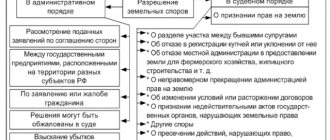Constitutional right to housing
The Basic Law of our vast Motherland, in Article 40, secured the right of every Russian citizen to housing. This article enshrines the main legal relations in the country’s housing sector.
The Housing Code of Russia in Article 15 defines the term “dwelling” - an isolated premises that is real estate and, accordingly, suitable for permanent residence of citizens (meets all sanitary and technical standards and other requirements of the legislation of the Russian Federation).
In turn, Part 1 of Article 16 of the Housing Code of the Russian Federation tells us what applies to residential premises: a residential building, an apartment, as well as their parts and a room, respectively.
The Housing Code does not limit the use of a home only for residence; it can also be used for professional activities or, for example, for individual entrepreneurship. It is prohibited to use housing for industrial purposes. The legislation stipulates that the right of ownership of housing is subject to state registration with a special body - Rossreestr.
Russian legislation establishes three types of housing ownership: state, private and municipal.
Currently, by order of Russian President Vladimir Putin, various government programs are operating in the country, providing the opportunity to purchase a first home or improve living conditions under special conditions. Such programs as “Housing”, “Providing housing for young families”, “Sustainable development of rural areas”, etc.
Prepared by Gazimagomedov Ali Arsenovich, legal consultant of the Federal State Budgetary Educational Institution of Higher Education Elets State University named after. I.A. Bunina
Read further:
Foreclosing on the only home
A law on the child’s right to housing after parental divorce has been adopted
The fate of the President's bills on housing for judges has become known
Right to housing
print version
Article 40 of the Constitution of the Russian Federation proclaims:
"1. Everyone has the right to housing. No one can be arbitrarily deprived of their home.
2. State authorities and local self-government bodies encourage housing construction and create conditions for the exercise of the right to housing.
3. Low-income people and other citizens specified in the law who need housing are provided with it free of charge or for an affordable fee from state, municipal and other housing funds in accordance with the norms established by law.”
The right to healthy housing is included as an integral part of the concept of a “decent standard of living” for every person, proclaimed by the Universal Declaration of Human Rights and the International Covenant on Economic, Social and Cultural Rights.
The constitutional right to housing expresses the essence of the system for meeting the housing needs of society, i.e. it is an essential fundamental right. The system of specific housing rights of citizens depends on it, which must comply with and not contradict it. The behavior of citizens, state bodies, and business entities when choosing options for solving housing problems from those legally possible in a specific life situation often depends on how the content of this right is determined.
The current Constitution reflects the change of eras in meeting housing needs, the transition to a new system, which consists of such constitutional foundations as the rejection of the state monopoly on property and economic activity, the establishment of equality and different forms of ownership, private ownership of housing and land. The state housing stock lost its dominant position, private ownership of the housing stock by citizens and legal entities, private design and construction organizations, banks arose, a market for housing, land, etc. emerged.
By enshrining the right to housing in the Constitution of the Russian Federation, a threefold goal is achieved:
- the moral requirement of society is determined, according to which everyone should have a roof over their head and not be forced to vagrancy;
— a legal principle is formulated that determines the actions of all branches of government, as well as the content of the relevant legislation;
— this right appears as a subjective right of a specific subject of housing legal relations (needing improvement of living conditions, tenant, owner).
The right to housing is implemented in the Housing Code of the Russian Federation, as well as in comprehensive laws and other acts. The legislation on the right to housing is associated with a large amount of law enforcement practice in courts of general jurisdiction, the Constitutional Court, and executive authorities.
The word “everyone” in the commented article means all individuals located on the territory of Russia. Legal entities - owners of residential premises, being participants in legal relations as landlords, do not have a constitutional right to housing (Part 2 of Article 671 of the Civil Code of the Russian Federation).
Residential premises under social rental agreements are not provided to foreign citizens and stateless persons, unless otherwise provided by an international treaty of the Russian Federation (Part 5 of Article 49 of the Housing Code of the Russian Federation).
The objects of housing rights are residential premises. Residential premises are recognized as isolated premises, which are real estate and are suitable for permanent residence of citizens (meets established sanitary and technical rules and regulations, other legal requirements; Article 15 of the Housing Code of the Russian Federation). Residential premises (single-apartment residential building, apartment, part of a residential building or apartment) are the subject of a rental agreement (social, commercial, rental of specialized residential premises).
However, housing is not only the premises that can be the object of a rental agreement. Any natural shelter has long served as a human home. On the other hand, many of the man-made premises (shelters) cannot be called dwellings due to their specific purpose, although one can stay (live) in them for a certain time. These are, for example, a hospital, a prison, a bomb shelter, a school, etc.
A dwelling can be considered not only as a type of premises, but also as a specific place in a specific territory that has address and geographic coordinates. For example, mobile (portable) dwellings of some peoples can be installed in a certain territory (in populated areas), where there are no restrictions on the right to freedom of movement and choice of place of residence.
The dwelling is always located in a certain place where a person permanently or primarily lives (Part 1 of Article 20 of the Civil Code of the Russian Federation). Place of residence means a residential building, apartment, office premises, specialized houses (dormitory, hotel-shelter, house of maneuverable fund, special home for single elderly people, boarding house for the disabled, veterans, etc.), as well as other residential premises, in which a citizen permanently or primarily resides as an owner, under a lease (sublease) agreement or on other grounds provided for by the legislation of the Russian Federation (Part 8 of Article 2 of the Law of the Russian Federation of June 25, 1993 “On the right of citizens of the Russian Federation to freedom of movement and choice of place stay and residence within the Russian Federation"). However, before determining a specific type of housing when choosing a place of residence, citizens determine the location in a specific territory within Russia where their house, apartment or other dwelling will be located.
You can choose a city, village or some other place to live. The territory of residence will have legal significance for possible restrictions on the right of citizens to freedom of movement, registration and deregistration at the place of residence, unauthorized construction of houses and buildings on a land plot not allocated for construction purposes.
A dwelling, therefore, can be understood as a chosen place, the address-geographical coordinates of which determine a room specially designed for the free residence of a person.
No one can be arbitrarily deprived of their home. This constitutional principle ensures the right to housing. Any deprivation of housing not based on the law is considered arbitrary. The legislation contains rules ensuring compliance with this principle.
Termination of ownership of a home is possible on the grounds provided for in Art. 235 of the Civil Code of the Russian Federation.
Family members of the owner or persons who have lost family ties with the owner of the residential premises, who have, on an equal basis with the owner, the right of common property with him, enjoy an equal right of ownership of the residential premises (common property) with him, regardless of the size of their share (Article 244 of the Civil Code of the Russian Federation ).
Special protection against arbitrary deprivation of housing is provided for members of the owner's family who are not homeowners. Thus, they are assigned the opportunity to live in residential premises under the conditions provided for by housing legislation (clause 1 of Article 292 of the Civil Code of the Russian Federation). This right is ensured by absolute protection from any person, including the owner of residential premises (clause 3 of article 292, article 305 of the Civil Code of the Russian Federation). The transfer of ownership of a residential building or apartment to another person does not entail the termination of the right to use the residential premises by family members of the previous owner (Clause 2 of Article 292 of the Civil Code of the Russian Federation).
The law establishes the grounds and procedure for eviction of citizens who are not homeowners (Articles 687, 688 of the Civil Code of the Russian Federation). In some cases, the legislator connects the possibility of deprivation of housing with the grounds for its provision or occupation. Thus, without the provision of other residential premises, citizens to whom they were provided in connection with their labor relations at a specific enterprise, institution, organization and who terminated these labor relations may be evicted from office premises and dormitories (Articles 107, 110 of the Housing Code of the Russian Federation). Citizens who arbitrarily occupied residential premises, as well as persons who received a warrant to occupy premises as a result of unlawful actions, are subject to eviction (Articles 99, 100 of the Housing Code of the Russian Federation).
Part 2 of the commented article is addressed to state authorities and local self-government, which are charged with the duty to encourage housing construction and create conditions for the exercise of the right to housing.
Encouraging housing construction means a wide range of activities of government bodies and local self-government bodies - from planning capital construction to accepting ready-made residential buildings for operation. This area of activity has been elevated to the constitutional level, since it ensures the fulfillment of the most important function of the welfare state - to provide people with housing.
Creating conditions for the exercise of the right to housing and encouraging housing construction require the implementation of financial, organizational, and legislative measures that best contribute to meeting the housing needs of citizens.
New forms of financing and lending for housing construction are provided.
As part of the implementation of the national project on affordable housing, a number of federal laws were adopted: Urban Planning Code of the Russian Federation (Article 16), dated December 30, 2004 No. 215-FZ “On Housing Savings Cooperatives” (Article 47), dated December 30, 2004 No. 214- Federal Law “On participation in shared construction of apartment buildings and other real estate” (Article 40), Resolution of the Administration of the Altai Territory dated 10.10.2014 No. 461 “On approval of the state program of the Altai Territory “State support for large families” for 2015 - 2021”, other regulations.
In the conditions of a market economic system, the implementation of the principle of meeting housing needs has necessitated the need for the state to take additional measures to help the poor and other citizens in need of housing. First of all, this refers to cases of free provision of housing from state and municipal funds, since in market conditions citizens must purchase housing through civil transactions.
Part 3 of the article under consideration establishes the new role of the state and local governments in the housing market, which is reduced to promoting housing construction and its encouragement, like any form of ownership, as well as the legal regulation of relations related to meeting the housing needs of society, determining the composition of the housing stock for social use for socially vulnerable segments of the population and other persons.
Everyone independently invests money in the purchase or construction of housing, or rental housing, not counting on solving their housing problem at the expense of state and municipal housing funds, but relying on a system of compensation (subsidies) and loans for the purchase of housing. This is how the housing problem is objectively solved for the majority. Minority, i.e. low-income people and other persons named in the laws are provided with housing in accordance with the norms established by law from state, municipal and other housing funds. They can use the space provided under the terms of social rental of residential premises for an affordable rent or free of charge.
According to part 2 of Art. 49 of the Housing Code of the Russian Federation, low-income citizens are citizens if they are recognized as such by a local government body in the manner established by the law of the relevant constituent entity of the Federation, taking into account the income per family member and the value of property owned by family members and subject to taxation. The regulatory basis for recognizing a citizen as low-income is the Government Decree of August 20, 2003 No. 512 “On the list of types of income taken into account when calculating the average per capita family income and the income of a citizen living alone to provide them with state social assistance”, the provisions of the Tax Code of the Russian Federation, the law of the Altai Territory of 07/06 .2006 No. 60-ZS “On the procedure for determining the amount of income per each family member and the value of property owned by family members and subject to taxation, in order to recognize citizens as low-income and provide them with residential premises of the municipal housing stock under social rental agreements” and other laws.
Along with the poor, there may be other citizens in need of housing. Part 3 Art. 49 of the Housing Code of the Russian Federation directly provides for the right of the federal and regional legislator to regulate the provision of residential premises to other categories of citizens under social rental agreements from the housing stock of the Russian Federation or the housing stock of a constituent entity of the Federation. Thus, the Law of the Altai Territory dated 09.05.2014 No. 64-ZS “On the provision of land plots for housing construction in order to protect the rights of citizens affected by emergencies and natural disasters” was adopted, the law of the Altai Territory dated 09.12.2005 No. 115-ZS “On the procedure for local government bodies to keep records of citizens as those in need of residential premises provided under social tenancy agreements,” Law of the Altai Territory dated September 14, 2006 No. 92-ZS “On vesting local government bodies with state powers to provide housing for veterans, disabled people and families with disabled children" (together with the "List of municipal districts and urban districts, the local governments of which are vested with state powers, and the amount of subventions provided to local budgets") and other regulations.
Low-income people and other citizens specified in the law are provided with housing only in cases of need. The conditions of need are defined in the Housing Code of the Russian Federation; additional conditions of need can be introduced by the laws of the constituent entities of the Federation, since, according to Art. 72 of the Constitution of the Russian Federation, issues of housing legislation are referred to the joint jurisdiction of the Russian Federation and its constituent entities.
Tenants of residential premises under a social tenancy agreement must pay fees for the maintenance and repair of residential premises, fees for the use of residential premises (rental fees) and fees for utilities.
Citizens recognized as low-income are exempt from paying fees for the use of residential premises (Part 9 of Article 156 of the Housing Code of the Russian Federation). The region has adopted: Law of the Altai Territory dated December 27, 2007 No. 156-ZS “On the provision of social support measures for payment of housing and utilities to certain categories of citizens in the Altai Territory”, Law of the Altai Territory dated December 7, 2007 No. 128-ZS “On the provision subsidies for the payment of housing and utilities in the Altai Territory”, etc., ensuring proportionality of payments made by citizens to their income. Date of publication: 01/12/2015 Date of modification: 14/12/2016
Housing rights and responsibilities of citizens
Citizens, at their own discretion and in their own interests, exercise their housing rights, including disposing of them. They are free to establish and exercise their housing rights by virtue of an agreement and (or) other grounds provided for by housing legislation. The exercise by citizens of their housing rights and the fulfillment of their duties arising from housing relations should not violate the rights, freedoms and legitimate interests of other citizens. Citizens legally located on the territory of the Russian Federation have the right to freely choose residential premises for residence as owners, tenants or on other grounds provided by law. Restrictions on the right of citizens to freedom of choice of residential premises for living are permitted only on the basis of the Housing Code or another federal law (Parts 2-5 of Article 1 of the Housing Code). Housing rights and obligations arise from the grounds provided for by the Housing Code, other federal laws and other regulatory legal acts of the Russian Federation, as well as from the actions of participants in housing relations, which, although not provided for by such acts, but due to the general principles and meaning of housing legislation give rise to housing rights and responsibilities. In accordance with this, housing rights and obligations arise:
- from contracts and other transactions provided for by federal law, as well as from contracts and other transactions, although not provided for by federal law, but not contradicting it;
- from acts of state bodies and local governments, which are provided for by housing legislation as the basis for the emergence of housing rights and obligations;
- from a court decision establishing housing rights and obligations;
- as a result of the acquisition of residential premises on the grounds permitted by federal law;
- as a result of membership in housing and housing-construction cooperatives;
- as a result of the actions of participants in housing relations or the occurrence of events with which federal law or other regulatory legal acts link the emergence of housing rights and obligations.
The main housing right of citizens is the right to use residential premises as an owner, tenant (subtenant), members of their family, and temporary tenant. At the same time, the law establishes the right of certain categories of persons to provide residential premises for the use of other citizens. According to Art. 11 of the Housing Code, the protection of violated housing rights is carried out by the court in accordance with the jurisdiction of cases established by procedural legislation. Protection of housing rights administratively is carried out only in cases provided for by the Housing Code and other federal laws. A decision made administratively may be challenged in court. Protection of housing rights is carried out by:
Did not you find what you were looking for?
Teachers rush to help
Diploma
Tests
Coursework
Abstracts
- recognition of housing law;
- restoring the situation that existed before the violation of housing rights and suppressing actions that violate this right or create a threat of its violation;
- recognition by the court as invalid in whole or in part of a normative legal act of a state body or local government body that violates housing rights and contradicts the Housing Code or a federal law adopted in accordance with the Housing Code, another normative legal act that has a greater value than the specified normative legal act of a state body or local body self-government, legal force;
- non-application of such a normative legal act by the court;
- termination or change of housing legal relationship;
- in other ways provided for by the Housing Code and other federal laws.
One of the main housing responsibilities of citizens is to use residential premises for their intended purpose. As stated in Art. 17 residential complex, residential premises are intended for the residence of citizens. It is permitted to use residential premises for professional activities or individual entrepreneurial activities by citizens legally residing there, if this does not violate the rights and legitimate interests of other citizens, as well as the requirements that the residential premises must meet. According to housing legislation (Part 3 of Article 17ZhK), the placement of industrial production in residential premises is not allowed. Civil legislation (clause 3 of Article 288 of the Civil Code) prohibits the placement of industrial production in residential buildings, which means that the provision of non-residential premises located in residential buildings for industrial needs is unacceptable. The use of residential premises is carried out taking into account the rights and legitimate interests of citizens and neighbors living in this premises, fire safety requirements, sanitary and hygienic, environmental and other legal requirements, as well as in accordance with the rules for the use of residential premises approved by the Government of the Russian Federation. The responsibilities of persons using residential premises also include ensuring the safety of the residential premises and maintaining it in proper condition (part 4 of article 30, paragraphs 2-3 of part 3 of article 67 of the Housing Code, part 1 of article 678 of the Civil Code). Article 20 of the Housing Code provides for state control over the use and safety of the housing stock, regardless of its form of ownership, as well as the compliance of residential premises and utilities with established requirements. This control is carried out by authorized federal executive authorities, state authorities of constituent entities of the Russian Federation in accordance with federal law and other regulatory legal acts of the Russian Federation. Unlike previous legislation, the Civil Code provided for the liability of owners for using residential premises for other purposes or in violation of the rights and freedoms of neighbors. According to Art. 293 of the Civil Code, if the owner of a residential premises uses it for other purposes or systematically violates the rights and interests of neighbors, the local government body may warn the owner of the need to eliminate the violations. In cases where, despite the warning, the owner continues to violate the rights and interests of neighbors or to use the residential premises for other purposes, the court, at the request of the local government body, may decide to sell such residential premises at public auction with payment to the owner of the proceeds from the sale for minus the costs of executing the court decision. The law also provided, as a last resort, the possibility of a similar termination of the owner’s right to residential premises in cases of mismanagement of housing leading to its destruction. This measure can be applied in court after assigning the owner a proportionate period to repair the premises. Residential property owners' responsibilities may include insuring their property. Such insurance can be carried out in order to guarantee compensation for losses associated with loss (destruction) or damage to residential premises, in accordance with the law (Article 21 of the Housing Code of the Russian Federation).








